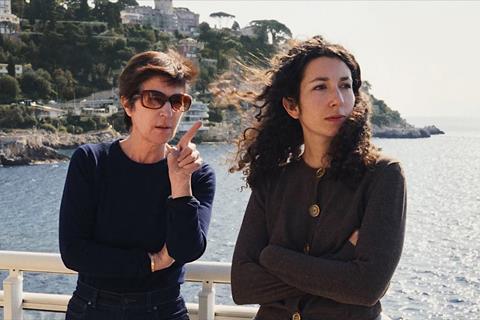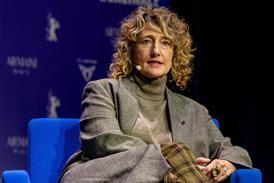French author Christine Angot confronts her family about her father’s sexual abuse

Dir/scr: Christine Angot. France. 2024. 82mins
The Médici prize-winning author Christine Angot has already confronted, in her writing, her experience of childhood sexual abuse by her late father, specifically in her 1999 novel Incest. Now, prompted by a book tour that takes her to Strasbourg where her father lived, and his widow and children still reside, Angot turns to documentary cinema to further interrogate the impact of this abuse on her wider family.
A raw, uncomfortable and affecting film
It is, not surprisingly, a raw, uncomfortable and affecting film, which explores the damage caused both by her father’s appalling acts, and by the complicity, conscious or otherwise, of the other adults around her. But Angot’s technique, of putting her interviewees on the spot, frequently seems more effective in provoking an agitated emotional response as opposed to a measured intellectual one.
A Family marks the film directing debut from Angot, but it is not her first cinema credit: she previously wrote two screenplays for Claire Denis, Let The Sunshine In (2017) and Both Sides Of The Blade (2022), the latter of which was based on her novel Un Tournant de la Vie. Angot’s approach to this documentary was unplanned and organic – one gets the sense that, initially, the act of turning the camera onto her life at this point was more about bearing witness to her own trauma and anger than it was about creating a public document. But the resulting film is a courageous, if somewhat uneven, work that opens doors to further discussion on the subject. Angot’s name recognition will make the film most marketable in Francophone territories but it could find further interest on the festival circuit, in particular in events focused on women’s issues.
Angot first met her father when she was 13; it was then that the abuse started. It continued, Angot says in a calm voiceover, at weekends and during holidays. The dispassionate tone of the narration is at odds with what plays out on screen: Angot, filmed in her hotel room in Strasbourg with no clear idea about how an encounter with her father’s widow, Elizabeth, will play out, or even if it will happen at all, is clearly distraught. The intensity of her emotional response when she revisits the neighbourhood where her father and his family lived almost prevents her from ringing the doorbell and confronting Elizabeth. But then she does, and anger takes over. There are accusations of ‘violence’ on both sides. Still, it is Angot who wedges her foot in the door and forcefully demands that her camerawoman be present for the conversation, against Elizabeth’s wishes.
It is a blisteringly uncomfortable encounter that offers some insight into Elizabeth’s delusions about the past. She refers to a “relationship” between Angot and her father. Angot corrects her: it was, she says “not a relationship. I was raped.” We later learn that Elizabeth subsequently filed a complaint against Angot for invasion of privacy, although the fact that the footage is included in the film suggests that an agreement was reached in the matter.
Other interviewees include Angot’s anguished mother (twice) and her ex-husband Claude, who is compelled to revisit his own rape as an 11-year-old child in the context of his reaction to Angot’s further experience of abuse by her father when she resumed contact with him as an adult. Finally, there is a painful interview with Angot’s daughter Léonore, a conversation that comes the closest of any of the encounters to offering a kind of closure to Angot.
In a more questionable device however, Léonore also appears as a toddler in home video footage shot in 1993, which is threaded through the film. The reasons for the inclusion of this material are not made clear, and as a result, it feels like a curious and disconcerting editorial decision.
Production company: Le Bureau Films
International sales: Le Bureau Sales sales@lebureaufilms.com
Producer: Bertrand Faivre, Alice Girard
Cinematography: Caroline Champetier, Inês Tagarin, Hugo Martin
Editing: Pauline Gaillard
























